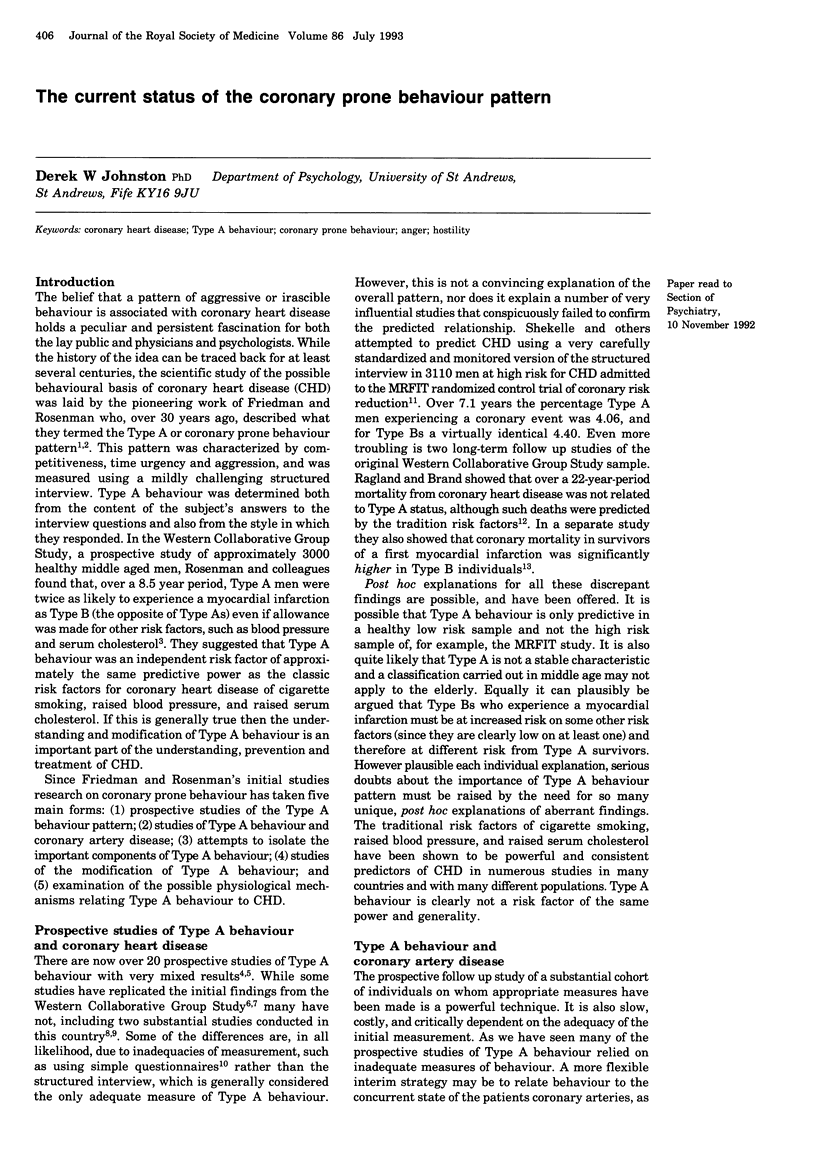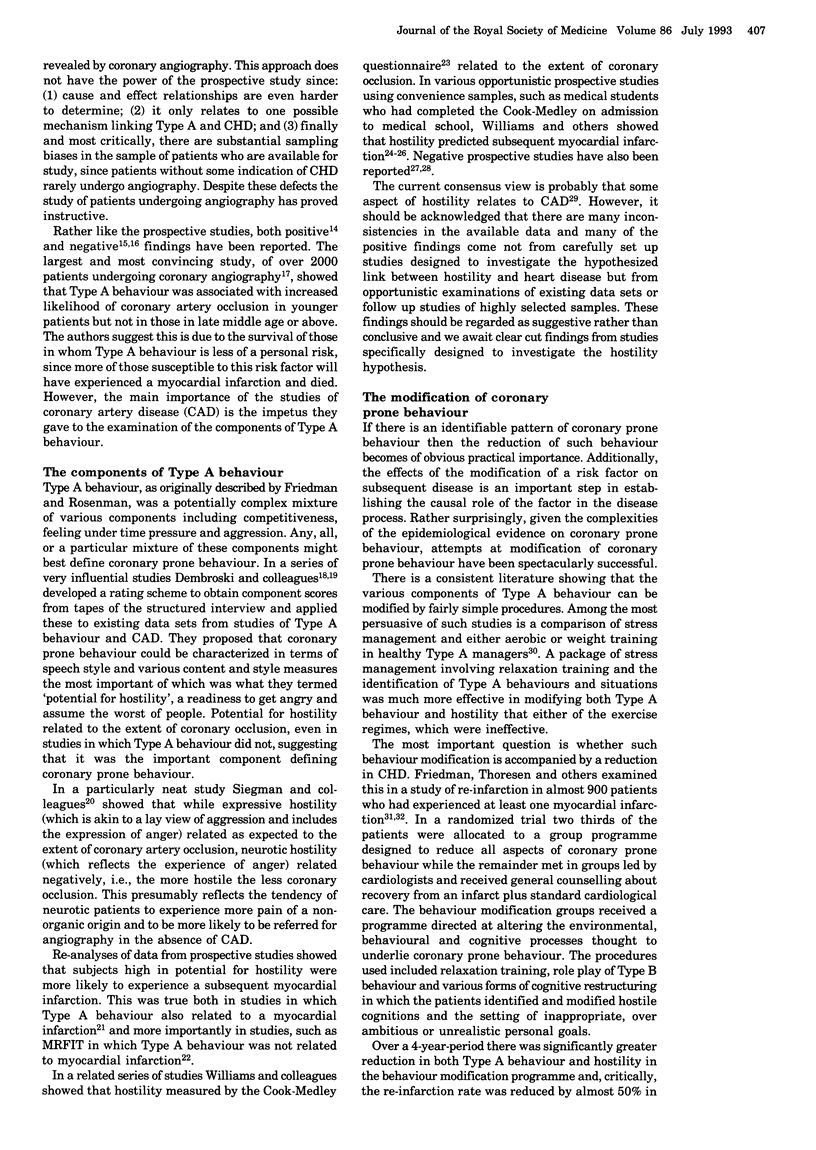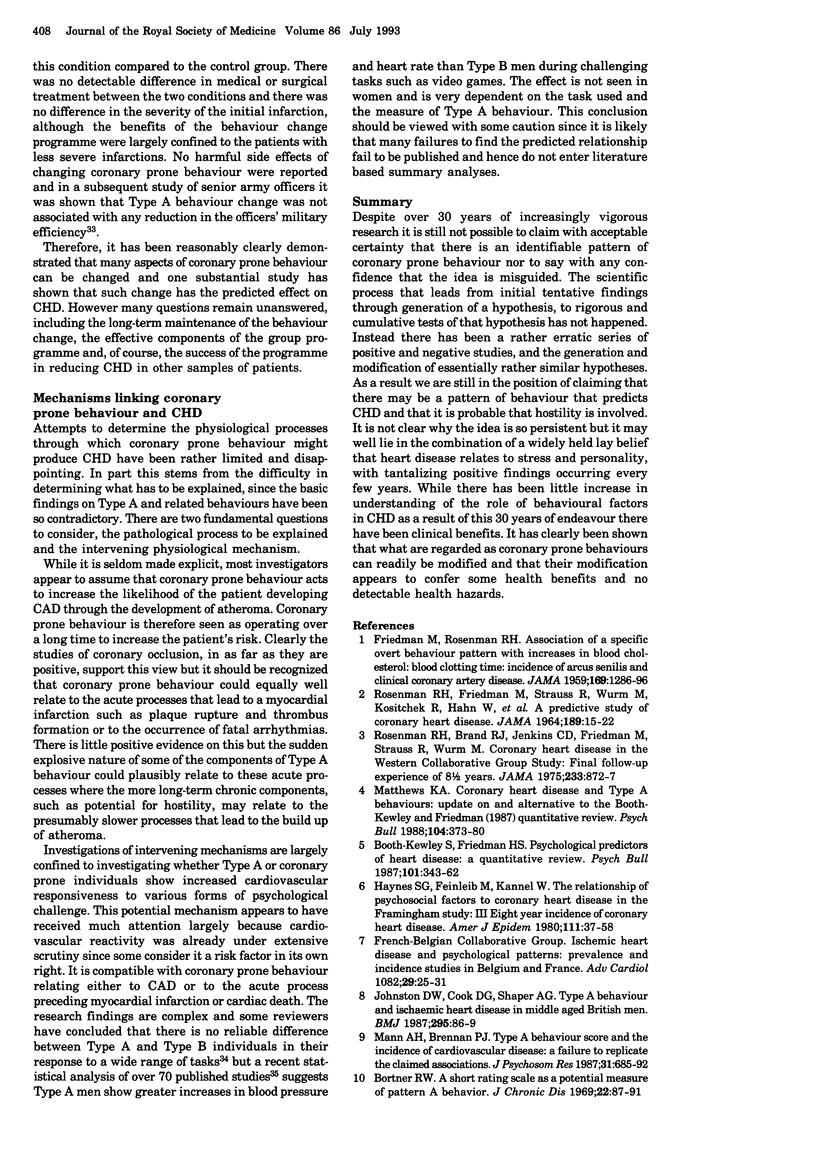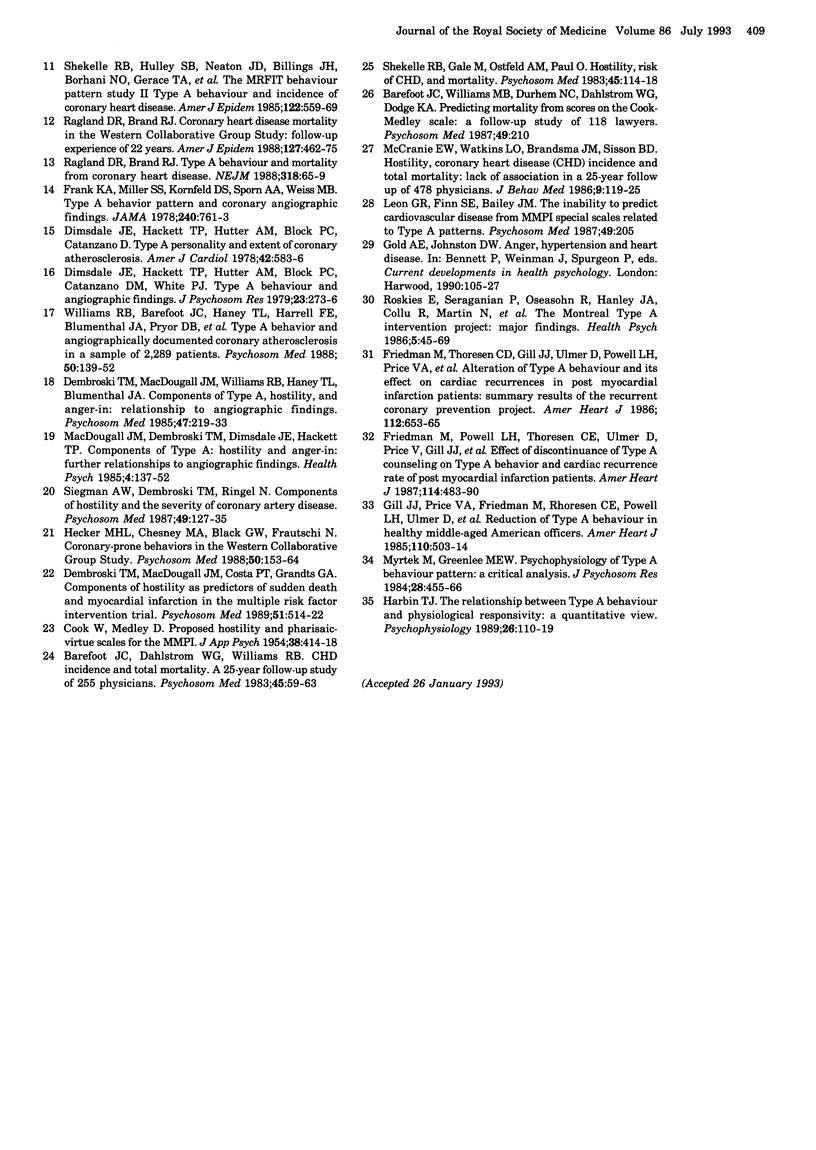Abstract
Despite over 30 years of increasingly vigorous research it is still not possible to claim with acceptable certainty that there is an identifiable pattern of coronary prone behaviour nor to say with any confidence that the idea is misguided. The scientific process that leads from initial tentative findings through generation of a hypothesis, to rigorous and cumulative tests of that hypothesis has not happened. Instead there has been a rather erratic series of positive and negative studies, and the generation and modification of essentially rather similar hypotheses. As a result we are still in the position of claiming that there may be a pattern of behaviour that predicts CHD and that it is probable that hostility is involved. It is not clear why the idea is so persistent but it may well lie in the combination of a widely held lay belief that heart disease relates to stress and personality, with tantalizing positive findings occurring every few years. While there has been little increase in understanding of the role of behavioural factors in CHD as a result of this 30 years of endeavour there have been clinical benefits. It has clearly been shown that what are regarded as coronary prone behaviours can readily be modified and that their modification appears to confer some health benefits and no detectable health hazards.
Full text
PDF



Selected References
These references are in PubMed. This may not be the complete list of references from this article.
- Barefoot J. C., Dahlstrom W. G., Williams R. B., Jr Hostility, CHD incidence, and total mortality: a 25-year follow-up study of 255 physicians. Psychosom Med. 1983 Mar;45(1):59–63. doi: 10.1097/00006842-198303000-00008. [DOI] [PubMed] [Google Scholar]
- Booth-Kewley S., Friedman H. S. Psychological predictors of heart disease: a quantitative review. Psychol Bull. 1987 May;101(3):343–362. [PubMed] [Google Scholar]
- Bortner R. W. A short rating scale as a potential measure of pattern A behavior. J Chronic Dis. 1969 Jul;22(2):87–91. doi: 10.1016/0021-9681(69)90061-7. [DOI] [PubMed] [Google Scholar]
- Dembroski T. M., MacDougall J. M., Costa P. T., Jr, Grandits G. A. Components of hostility as predictors of sudden death and myocardial infarction in the Multiple Risk Factor Intervention Trial. Psychosom Med. 1989 Sep-Oct;51(5):514–522. doi: 10.1097/00006842-198909000-00003. [DOI] [PubMed] [Google Scholar]
- Dembroski T. M., MacDougall J. M., Williams R. B., Haney T. L., Blumenthal J. A. Components of Type A, hostility, and anger-in: relationship to angiographic findings. Psychosom Med. 1985 May-Jun;47(3):219–233. doi: 10.1097/00006842-198505000-00001. [DOI] [PubMed] [Google Scholar]
- Dimsdale J. E., Hackett T. P., Hutter A. M., Jr, Block P. C., Catanzano D. M., White P. J. Type A behavior and angiographic findings. J Psychosom Res. 1979;23(4):273–276. doi: 10.1016/0022-3999(79)90030-8. [DOI] [PubMed] [Google Scholar]
- Dimsdale J. E., Hackett T. P., Hutter A. M., Jr, Block P. C., Catanzano D. Type A personality and extent of coronary atherosclerosis. Am J Cardiol. 1978 Oct;42(4):583–586. doi: 10.1016/0002-9149(78)90627-6. [DOI] [PubMed] [Google Scholar]
- FRIEDMAN M., ROSENMAN R. H. Association of specific overt behavior pattern with blood and cardiovascular findings; blood cholesterol level, blood clotting time, incidence of arcus senilis, and clinical coronary artery disease. J Am Med Assoc. 1959 Mar 21;169(12):1286–1296. doi: 10.1001/jama.1959.03000290012005. [DOI] [PubMed] [Google Scholar]
- Frank K. A., Heller S. S., Kornfeld D. S., Sporn A. A., Weiss M. B. Type A behavior pattern and coronary angiographic findings. JAMA. 1978 Aug 25;240(8):761–763. [PubMed] [Google Scholar]
- Friedman M., Powell L. H., Thoresen C. E., Ulmer D., Price V., Gill J. J., Thompson L., Rabin D. D., Brown B., Breall W. S. Effect of discontinuance of type A behavioral counseling on type A behavior and cardiac recurrence rate of post myocardial infarction patients. Am Heart J. 1987 Sep;114(3):483–490. doi: 10.1016/0002-8703(87)90742-3. [DOI] [PubMed] [Google Scholar]
- Friedman M., Thoresen C. E., Gill J. J., Ulmer D., Powell L. H., Price V. A., Brown B., Thompson L., Rabin D. D., Breall W. S. Alteration of type A behavior and its effect on cardiac recurrences in post myocardial infarction patients: summary results of the recurrent coronary prevention project. Am Heart J. 1986 Oct;112(4):653–665. doi: 10.1016/0002-8703(86)90458-8. [DOI] [PubMed] [Google Scholar]
- Gill J. J., Price V. A., Friedman M., Thoresen C. E., Powell L. H., Ulmer D., Brown B., Drews F. R. Reduction in type A behavior in healthy middle-aged American military officers. Am Heart J. 1985 Sep;110(3):503–514. doi: 10.1016/0002-8703(85)90067-5. [DOI] [PubMed] [Google Scholar]
- Harbin T. J. The relationship between the type A behavior pattern and physiological responsivity: a quantitative review. Psychophysiology. 1989 Jan;26(1):110–119. doi: 10.1111/j.1469-8986.1989.tb03138.x. [DOI] [PubMed] [Google Scholar]
- Haynes S. G., Feinleib M., Kannel W. B. The relationship of psychosocial factors to coronary heart disease in the Framingham Study. III. Eight-year incidence of coronary heart disease. Am J Epidemiol. 1980 Jan;111(1):37–58. doi: 10.1093/oxfordjournals.aje.a112873. [DOI] [PubMed] [Google Scholar]
- Hecker M. H., Chesney M. A., Black G. W., Frautschi N. Coronary-prone behaviors in the Western Collaborative Group Study. Psychosom Med. 1988 Mar-Apr;50(2):153–164. doi: 10.1097/00006842-198803000-00005. [DOI] [PubMed] [Google Scholar]
- Johnston D. W., Cook D. G., Shaper A. G. Type A behaviour and ischaemic heart disease in middle aged British men. Br Med J (Clin Res Ed) 1987 Jul 11;295(6590):86–89. doi: 10.1136/bmj.295.6590.86. [DOI] [PMC free article] [PubMed] [Google Scholar]
- MacDougall J. M., Dembroski T. M., Dimsdale J. E., Hackett T. P. Components of type A, hostility, and anger-in: further relationships to angiographic findings. Health Psychol. 1985;4(2):137–152. doi: 10.1037//0278-6133.4.2.137. [DOI] [PubMed] [Google Scholar]
- Mann A. H., Brennan P. J. Type A behaviour score and the incidence of cardiovascular disease: a failure to replicate the claimed associations. J Psychosom Res. 1987;31(6):685–692. doi: 10.1016/0022-3999(87)90017-1. [DOI] [PubMed] [Google Scholar]
- Matthews K. A. Coronary heart disease and type A behaviors: update on and alternative to the Booth-Kewley and Friedman (1987) quantitative review. Psychol Bull. 1988 Nov;104(3):373–380. doi: 10.1037/0033-2909.104.3.373. [DOI] [PubMed] [Google Scholar]
- McCranie E. W., Watkins L. O., Brandsma J. M., Sisson B. D. Hostility, coronary heart disease (CHD) incidence, and total mortality: lack of association in a 25-year follow-up study of 478 physicians. J Behav Med. 1986 Apr;9(2):119–125. doi: 10.1007/BF00848472. [DOI] [PubMed] [Google Scholar]
- Myrtek M., Greenlee M. W. Psychophysiology of type A behavior pattern: a critical analysis. J Psychosom Res. 1984;28(6):455–466. doi: 10.1016/0022-3999(84)90079-5. [DOI] [PubMed] [Google Scholar]
- ROSENMAN R. H., FRIEDMAN M., STRAUS R., WURM M., KOSITCHEK R., HAHN W., WERTHESSEN N. T. A PREDICTIVE STUDY OF CORONARY HEART DISEASE. JAMA. 1964 Jul 6;189:15–22. doi: 10.1001/jama.1964.03070010021004. [DOI] [PubMed] [Google Scholar]
- Ragland D. R., Brand R. J. Coronary heart disease mortality in the Western Collaborative Group Study. Follow-up experience of 22 years. Am J Epidemiol. 1988 Mar;127(3):462–475. doi: 10.1093/oxfordjournals.aje.a114823. [DOI] [PubMed] [Google Scholar]
- Ragland D. R., Brand R. J. Type A behavior and mortality from coronary heart disease. N Engl J Med. 1988 Jan 14;318(2):65–69. doi: 10.1056/NEJM198801143180201. [DOI] [PubMed] [Google Scholar]
- Rosenman R. H., Brand R. J., Jenkins D., Friedman M., Straus R., Wurm M. Coronary heart disease in Western Collaborative Group Study. Final follow-up experience of 8 1/2 years. JAMA. 1975 Aug 25;233(8):872–877. [PubMed] [Google Scholar]
- Roskies E., Seraganian P., Oseasohn R., Hanley J. A., Collu R., Martin N., Smilga C. The Montreal Type A Intervention Project: major findings. Health Psychol. 1986;5(1):45–69. doi: 10.1037//0278-6133.5.1.45. [DOI] [PubMed] [Google Scholar]
- Shekelle R. B., Gale M., Ostfeld A. M., Paul O. Hostility, risk of coronary heart disease, and mortality. Psychosom Med. 1983 May;45(2):109–114. doi: 10.1097/00006842-198305000-00003. [DOI] [PubMed] [Google Scholar]
- Shekelle R. B., Hulley S. B., Neaton J. D., Billings J. H., Borhani N. O., Gerace T. A., Jacobs D. R., Lasser N. L., Mittlemark M. B., Stamler J. The MRFIT behavior pattern study. II. Type A behavior and incidence of coronary heart disease. Am J Epidemiol. 1985 Oct;122(4):559–570. doi: 10.1093/oxfordjournals.aje.a114135. [DOI] [PubMed] [Google Scholar]
- Siegman A. W., Dembroski T. M., Ringel N. Components of hostility and the severity of coronary artery disease. Psychosom Med. 1987 Mar-Apr;49(2):127–135. doi: 10.1097/00006842-198703000-00003. [DOI] [PubMed] [Google Scholar]
- Williams R. B., Jr, Barefoot J. C., Haney T. L., Harrell F. E., Jr, Blumenthal J. A., Pryor D. B., Peterson B. Type A behavior and angiographically documented coronary atherosclerosis in a sample of 2,289 patients. Psychosom Med. 1988 Mar-Apr;50(2):139–152. doi: 10.1097/00006842-198803000-00004. [DOI] [PubMed] [Google Scholar]


